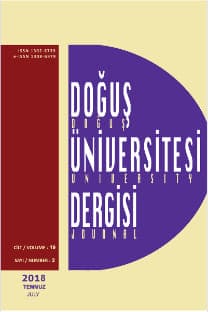Understandıng and acceptance of evolutionary theory among Turkish university students
Türk üniversite öğrencileri arasında evrim teorisini anlama ve kabul etme
___
ALTERS, B.J., ALTERS, S. (2001). Defending evolution in the classroom: A guide to the creation/evolution controversy. Boston: Jones and Bartlett.ALTERS, B.J., NELSON, C.E. (2002). Perspective: Teaching evolution in higher education. Evolution, 56, 1891-1901.
ANDERSON, D.L., FISHER, K.M., NORMAN, G.J. (2002). Development and evaluation of the conceptual inventory of natural selection. Journal of Research in Science Teaching, 39, 952-978.
ANDERSON, R.D. (2007). Teaching the theory of evolution in social, intellectual, and pedagogical context. Science Education, 91, 664-677.
APAYDIN, Z., SÜRMELİ, H. (2009). Üniversite öğrencilerinin evrim teorisine yönelik tutumları. Ilköğretim Online, 8, 820-842.
AROUA, S., COQUIDE, M., & ABBES, S. (2009). Overcoming the effect of the socio- cultural context: Impact of teaching evolution in Tunisia. Evolution: Education and Outreach, 2, 474-478.
ASGHAR, A., WILES, J.R., ALTERS, B. (2007). Canadian pre-service elementary teachers’ conceptions of biological evolution and evolution education. McGill Journal of Education, 42, 189-209.
BAUMGARTNER, E., DUNCAN, K. (2009). Evolution of students' ideas about natural selection through a constructivist framework. The American Biology Teacher, 71, 218- 227.
BLOOM, P., WEISBERG, D.S. (2007). Childhood origins of adult resistance to science. Science, 316, 996-997.
BREM, S.K., RANNEY, M., SCHINDEL, J. (2003). Perceived consequences of evolution: College students perceive negative personal and social impact in evolutionary theory. Science Education, 87, 181–206.
CHINSAMY, A., PLAGANYI, E. (2007). Accepting evolution. Evolution, 62, 248-254.
ÇETİNKAYA, H. (2006). Evrim, bilim ve eğitim üzerine. Ege Eğitim Dergisi, 1(7), 1-21.
DAGHER, Z. R., BOUJAOUDE, S. (2005). Students’ perceptions of the nature of evolutionary theory. Science Education, 89, 378-391.
DENİZ, H., DONNELLY, L.A., & YILMAZ, I. (2008). Exploring the factors related to acceptance of evolutionary theory among Turkish preservice biology teachers: Toward a more informative conceptual ecology for biological evolution. Journal of Research in Science Teaching, 45, 420-443.
KAMPOURAKIS, K., ZOGZA, V. (2009). Preliminary evolutionary explanations: A basic framework for conceptual change and explanatory coherence in evolution. Science & Education, 18, 1313-1340.
LADINE, T.A. (2009). Attitudes of students at a private Christian liberal arts university toward the teaching of evolution. Evolution: Education and Outreach, 2, 386-392.
LOMBROZO, T., THANUKOS, A., WEISBERG, M. (2008). The importance of understanding the nature of science for accepting evolution. Evolution: Education and Outreach, 1, 290-298.
MARTIN-HANSEN, L.M. (2007). First-year college students’ conflict with religion and science. Science & Education, 17, 317-357.
MCCRORY, C., MURPHY, C. (2009). The growing visibility of creationism in Northern Ireland: Are new science teachers equipped to deal with the issues? Evolution: Education and Outreach, 2, 372-385.
MILLER, J.D., SCOTT, E.C., & OKATOMO, S. (2006). Public acceptance of evolution. Science, 313, 765-766.
NADELSON, L. S. (2009). Preservice teacher understanding and vision of how to teach biological evolution. Evolution: Education and Outreach, 2, 490-504.
NEHM, R.H., REILLY, L. (2007). Biology majors’ knowledge and misconceptions of natural selection. BioScience, 57, 263-272.
NEHM, R.H., SCHONFELD, I. S. (2008). Measuring knowledge of natural selection: A comparison of the CINS, an open-response instrument, and an oral interview. Journal of Research in Science Teaching, 45, 1131-1160.
NELSON, C.E. (2008). Teaching evolution (and all of biology) more effectively: Strategies for engagement, critical reasoning, and confronting misconceptions. Integrative and Comparative Biology, 48, 213-225.
PEKER, D., CÖMERT, G.S., KENCE, A. (2010). Three decades of anti- evolution campaign and its results: Turkish undergraduates’ acceptance and understanding of the biological evolution theory. Science & Education, 19, 739-755.
PIGLIUCCI, M. (2002). Denying evolution: Creationism, scientism, and the nature of science. Sunderland, MA: Sinauer.
PIGLIUCCI, M. (2007) The evolution-creation wars: Why teaching more science just is not enough. McGill Journal of Education, 42, 285-306.
PRINOU, L., HALKIA, L., SKORDOULIS, C. (2009). What conceptions do Greek school students form about biological evolution? Evolution: Education and Outreach, 2, 312- 317.
REISS, M. J. (2009). The relationship between evolutionary biology and religion. Evolution, 63, 1934-1941.
ROBBINS J. R., ROY, P. (2007). The natural selection: Identifying and correcting non- science student preconceptions through an inquiry-based, critical approach to evolution. The American Biology Teacher, 69, 460-466.
SCOTT, E.C. (2009). Evolution vs. creationism: An introduction. Berkeley: University of California Press.
SINATRA, G.M., BREM, S.K., & EVANS, E.M. (2008). Changing minds? Implications of conceptual change for teaching and learning about biological evolution. Evolution: Education and Outreach, 1, 189-195.
SINATRA, M.G., SOUTHERLAND, S.A., MCCONAUGHY, F. DEMASTES, J.W. (2003). Intentions and beliefs in students’ understanding and acceptance of biological evolution. Journal of Research in Science Teaching, 40, 510-528.
STANOVICH, K.E. (2008). Higher order preferences and the master rationality motive. Thinking and Reasoning, 14, 111-128.
TRANI, R. (2004). I won’t teach evolution; it’s against my religion. And now for the rest of the story... The American Biology Teacher, 66, 419-427.
VERHEY, S.D. (2005). The effect of engaging prior learning on student attitudes toward creationism and evolution. BioScience, 55, 996-1003.
WILLIAMS, J.D. (2009). Belief versus acceptance: Why do people not believe in evolution? BioEssays, 31, 1255-1262.
- ISSN: 1302-6739
- Yayın Aralığı: Yılda 2 Sayı
- Başlangıç: 2000
- Yayıncı: Doğuş Üniversitesi
TÜRKİYE 2023 YILINDA DÜNYANIN ON BÜYÜK EKONOMİSİNDEN BİRİ OLABİLİR Mİ?
YOLSUZLUKLARIN VERGİ GELİRLERİ ÜZERİNDEKİ ETKİSİ: DİNAMİK PANEL VERİ ANALİZİ
Hasan BÜLBÜL, Murat AKIN, Ömür DEMİRER, İ. Can DOĞAN
GEÇİŞ EKONOMİLERİ VE YENİ KURUMSAL İKTİSAT’IN YENİDEN YÜKSELİŞİ
İHRACAT PERFORMANSI AÇISINDAN TEKNOLOJİK YENİLİĞİN ÖNEMİ: TÜRKİYE İMALAT SANAYİ ÖRNEĞİ
Nisfet UZAY, Mustafa DEMİR, Ertuğrul YILDIRIM
Türkiye 2023 yılında dünyanın on büyük ekonomisinden biri olabilir mi?
Interlinkages between openness and foreign debt in Pakistan
Türk üniversite öğrencileri arasında evrim teorisini anlama ve kabul etme
Efsun ANNAÇ, Hasan G BAHÇEKAPILI
PAKİSTAN’DA DIŞA AÇIKLIK İLE DIŞ BORÇ ARASINDA KARŞILIKLI BAĞLANTI
TÜRKİYE’DE ENFLASYON HEDEFLEMESİ ALTINDA SOSYAL REFAHTAKİ DEĞİŞİM
